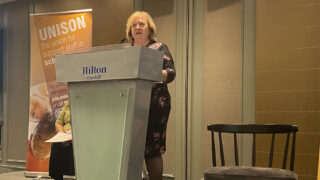“We started a closed Facebook group on a Friday and by the Sunday it had 600 members,” UNISON local government heard as they listened to the inspirational stories of school support staff from Derby and Durham.
The staff from both areas were faced with huge cuts to their pay and conditions.
Becky Everett from Derby told conference that she lost £264 a month and explained how this affected her life. As a single mum with two teenage sons, she had to stop her sons taking part in some of the extra-curricular activities they had been doing.
“Last October, I had to take a second job so that my sons could have Christmas.” Then, when sitting in the staff room at school, as colleagues discussed the work Christmas night out and she knew she couldn’t attend because she couldn’t afford it.
Julia Redfern, a teaching assistant in Derby city special school, explained how members in Derby joined together and fought the changes.
They went to Parliament to lobby MPs; they went to the Labour Party conference in Liverpool; they held a 24-hour vigil outside the Derby city council building on a cold February night, and they took 73 days of strike action.
Though Ms Redfern said “taking action isn’t easy, we felt guilty leaving our classes and our children,” the strike and all the campaigning paid off.
Derby council agreed to come back to the table to negotiate, and offered a much better deal that was accepted by 91% of UNISON members. B
ecky Everett is currently working seven days a week, but the deal they have won means things will change: “For me, the offer we have fought for and won means I won’t have to work seven days a week forever.”
Over in Durham, negotiations are not as far along as Derby, but the campaign there has also been far-reaching.
Megan Chalton told conference that she and her colleagues were “sick to death of being told by the council that we were paid for more hours than we worked, when we knew we work more than we are paid for.”
As with Derby, the school support staff united and campaigned when faced with life-changing pay cuts. They went on strike for four days, held demonstrations and rallies, and a march which saw 700 school support staff walking through the streets of Durham with support from the local community.
School support staff in Durham will be offered a new deal. Megan said it looks better, but they don’t yet have all the details, and she doesn’t know if UNISON members will accept it.
What is clear from both Durham and Derby is that being in UNISON has kept the staff strong through difficult times.
All three speakers had never been to conference before, and all made it clear that what happened to them caused them to become active, and that doesn’t look likely to change.
Becky Everett explained that, “being involved in this campaign has opened up doors for me. I’m now an active steward, I’ve become Derby City Council branch’s equalities officer.
“I have joined the Labour Party to help changeLabour in Derby and I campaigned in the run-up to the general election.”
In Durham the same has happened. As Megan Chalton said: “None of us were activists before, but I think it’s safe to say most of us are activists now.”




